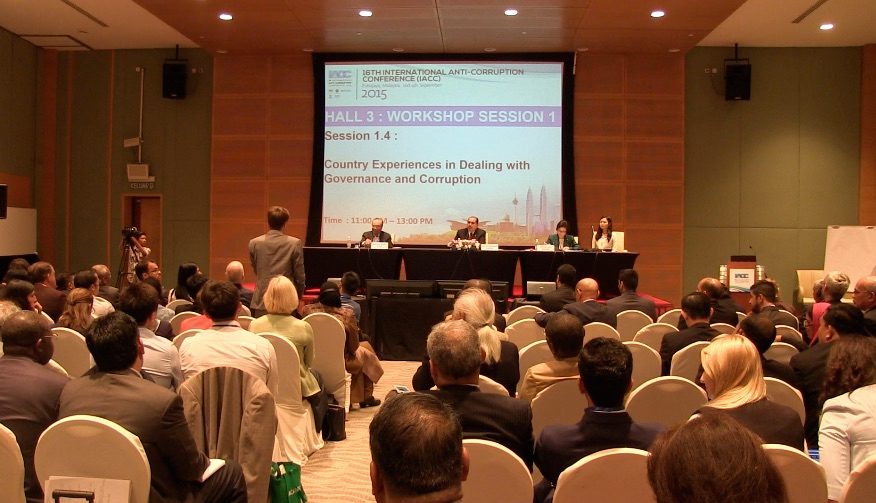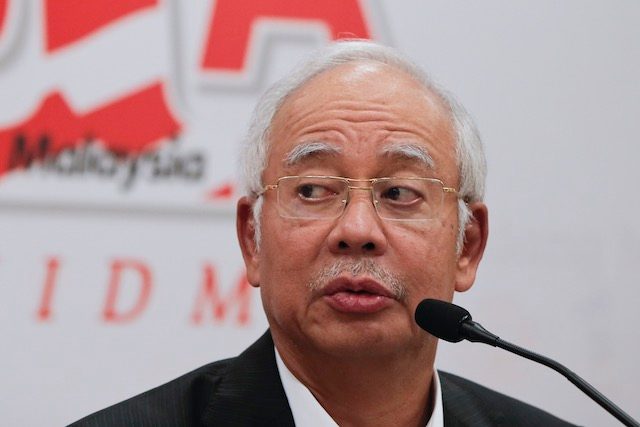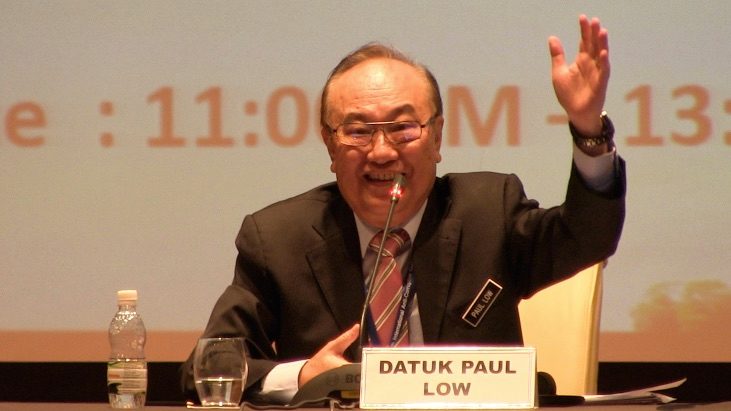SUMMARY
This is AI generated summarization, which may have errors. For context, always refer to the full article.

PUTRAJAYA, Malaysia (UPDATED) – Malaysian Prime Minister Najib Razak snubbed a global anti-corruption summit his country is hosting as he faces allegations $700 million from a state investment fund were transferred to his bank accounts.
The embattled leader at the center of Malaysia’s biggest political and economic scandal was supposed to deliver the keynote address to open the International Anti-Corruption Conference (IACC) of the global watchdog Transparency International (TI) on Wednesday, September 2. Yet a minister from his department represented him, and defended his absence.
“[He] was advised that he comes here as head of the government of the country. You expect a certain amount of protocol. You have a meeting of fearless activists. The issue is how is the reception to [him]. I said it will be hostile,” said Paul Low, minister in the Prime Minister’s Department in charge of Governance and Integrity.
Low said that up until Tuesday, Najib was considering attending the world’s largest gathering of anti-corruption advocates. Yet the minister said that Najib’s advisers and TI advised the premier against coming.
The conference began just days after thousands of Malaysians held a protest over the weekend calling on Najib to resign over the alleged corruption and mismanagement of state investment fund 1Malaysia Development Berhad (1MDB), the prime minister’s brainchild. Najib is also the finance minister, and heads 1MDB’s advisory board.
During the opening session, Transparency International chair Jose Ugaz called out Najib in a strongly worded speech.
“There are two questions that need to be answered: Who paid the money and why? Where did it go? One man could answer those questions.”
“If that does not happen then only a fully independent investigation, free from political interference, can uncover the truth. Until that happens, no claim from the government on anti-corruption will be credible,” Ugaz added.
Ugaz cited how the Najib administration replaced the attorney-general, suspended the 1MDB task force, arrested or transferred investigators at the anti-corruption body, and suspended newspapers.
“These are not the actions of a government that is fighting corruption. We may well hear promises of reform. That is not what is needed at this time. And promises alone will not restore confidence and trust,” said the TI chair.
At an earlier session titled “Country Experiences in Dealing with Governance and Corruption,” Low made no mention of Najib or the 1MDB scandal. Yet delegates and journalists pressed him with questions on the issue.

The minister defended the government’s investigation of 1MDB from criticism that Najib effectively stalled the probe.
“The Malaysian Anti-Corruption Commission, police and the central bank, those are and should be independent bodies. They don’t need the prime minister or Cabinet’s permission to investigate. It’s under their act. Automatically, they go and do [that] themselves,” said Low, a former president of TI-Malaysia.
Low said the “problem” with the investigation is that documents were leaked, with the Wall Street Journal, the UK-based Sarawak Report, and the local The Edge publications reporting about Najib’s alleged links to the scandal.
“In Malaysia, you ‘whistleblow’ to the appropriate authority, not to the outside. Because once you leak out, you make an accusation without the person being able to defend himself,” said Low. “The problem is when the information is leaked out, it undermines the integrity of the investigation.”
The 1MDB scandal has hounded Malaysia’s government for months now following revelations that it overpaid to purchase power assets, and now suffers a debt of $11 billion. The controversy worsened for Najib after media reported that deposits to his bank accounts ahead of the 2013 general election were linked to 1MDB agencies, banks and companies.
The prime minister denied the reports as “political sabotage,” saying the money was a donation from an undisclosed entity in the Middle East.
‘What’s purpose of your assembly?’
Low defended the government’s ban of the weekend protest called Bersih, the Malay word for “clean.” The government called organizers for questioning, along with former Prime Minister Mahathir Mohamad, Najib’s fiercest critic and former mentor.
“The government allows assembly but the important thing is: what is the purpose of your assembly? If it’s against corruption, injustice, no problem,” Low said.
“[But] the purpose of assembly in the [protest] was they want the Prime Minister to resign, and they want a caretaker government and between one year, they want new elections. So it’s not just an assembly against corruption. It’s a mini or an Arab Spring. It’s different.”
Low added that the protesters sought to undermine parliamentary democracy. “We disallow it.”
On its website, Bersih said it wants Najib to resign “because we demand moral uprightness in leaders.”
The coalition of NGOs is also pushing for electoral reforms, free and fair access to media, strengthening public institutions, and stopping corruption and “dirty politics.”
Low credited Bersih and the police for the peaceful demonstration, calling it a “milestone” for Malaysia. Still, the minister said that the advocates’ means for change was wrong.
“If you don’t like the government, in the parliamentary process, you have the right to use your votes. But just because the results are not what you expected, and you want to bring the government down midterm, just wait for the next elections,” said Low.
In 2013, Najib’s ruling coalition lost the popular vote but held on to power because of a gerrymandered voting system. Critics also accuse it of using compliant courts and colonial-era sedition lows to maintain dominance.
Najib’s United Malays National Organization (UMNO) has headed every government since Malaysia gained independence from Britain in 1957.
‘Malaysia still competitive’

Low sought to assure observers and foreign investors about the controversy’s impact on Malaysia’s economy. The ringgit is Asia’s worst performing currency this year.
On Tuesday, Fitch Ratings voiced concern that the scandal might distract the government from managing the economy.
Low cited Malaysia’s global rankings to address the concerns. “In World Bank’s Ease of doing Business [report], we are number 6 in the world. People speak so much about corruption in Malaysia but how come we are 6th? It shows corruption is in a certain area but doesn’t affect the nation’s competitiveness.”
Still, the minister acknowledged that Malaysia has to “deal with integrity” if it were to reach its goal of being a developed nation by 2020.
Not all delegates were convinced by Low’s assurances.
Kenyan parliamentarian Shakeel Shabbir Ahmed, the first to question Low on 1MDB, said Najib’s absence in the conference spoke volumes.
“The PM must be beyond reproach, like Caesar’s wife. Any allegation, wild allegation or not, needs to be met with a serious approach. The fact that he’s not turning up this afternoon because he feels an activist will shout him down is not right,” Shakeel told Rappler.
“It gives a wrong turn for the whole direction of the IACC but I’m not Malaysian. Malaysians need to decide themselves.” – Rappler.com
Add a comment
How does this make you feel?
There are no comments yet. Add your comment to start the conversation.